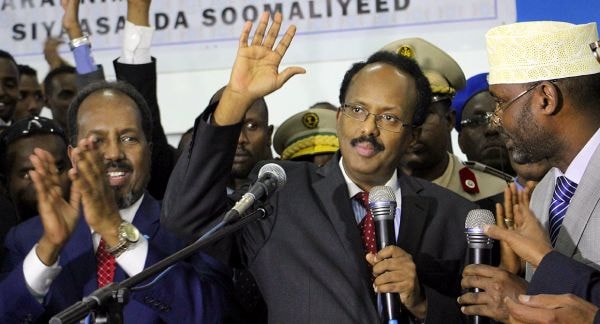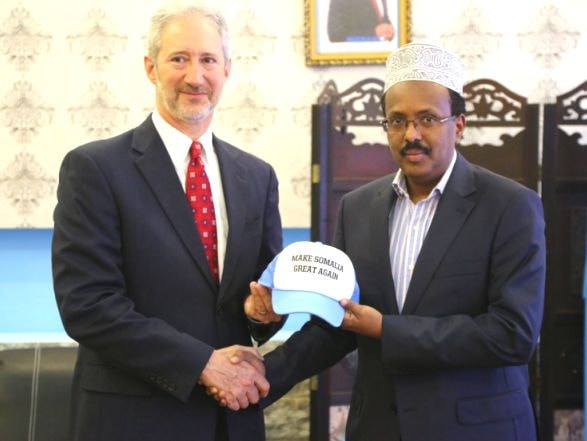From refugee to president
(Baonghean) - Not many people believe in the scenario of a refugee in the US returning home to win a political victory. Mohamed Abdullahi Mohamed is writing a fairy tale in Somalia when he took office as President with the desire to bring changes to this poor and violent country.
Fairy tale
The February 8 presidential election in Somalia made history. Mohamed Abdullahi Mohamed, a Somali-born immigrant who immigrated to the United States, became president of this country mired in poverty and war. His surprising victory was celebrated with camel meat in the capital, Mogadishu, and cheers at the Buffalo-area New York Transit Authority office where he once worked as an office worker.
What makes this victory remarkable is that at the time, a federal court in the United States was deciding the fate of the immigration ban on people like him. It is all the more surprising that a man steeped in American democratic values would have to confront the corruption, anarchy and terrorism that are rampant in this Horn of Africa country.
 |
| Somali President Mohamed Abdullahi Mohamed was once an asylum seeker in the US. Photo: Politico |
President Mohamed's fairy tale began in 1988 when he was the first secretary of the Somali embassy in Washington, DC. He decided it would be too dangerous to return to his country at a time of turmoil, so he applied for asylum in the United States. And for the next 25 years, he worked hard to achieve his goals. He graduated from college and graduate school in history and political science, then became a representative for immigrants. Step by step, he learned the lessons of civil society and management science from the United States, which he knew would be needed for Somalia.
“He always expressed a desire to go back and try to bring peace,” said Joel Giambra, a former county executive in Erie, New York, where Mohamed ran for office. “That was always his ambition.”
In fact, Mohamed never wanted to leave his homeland. He was born into a wealthy and well-connected tribe. His father, who had spent much of his life under Italian colonial rule, was also a government employee. Mohamed’s nickname was “Farmaajo,” which means cheese in Italian. After graduating from high school, Mohamed applied for a position in the Somali Foreign Ministry. In 1985, he was sent to Washington, DC, to work at the embassy there. And so the fairy tale began.
Desire for change
Mohamed’s rise to the top of Somalia’s political hierarchy was a process and it happened naturally because of his talent and dedication. Mohamed started from zero when he decided to bring his wife to the United States and settle in Buffalo County, where a Somali community had also chosen to settle here a few years ago. His ability and dedication helped him to be nominated for a small position on the Buffalo County local council.
In 1999, he helped Giambra run for county commissioner. Three years later, he made a bid for coordinator of the New York Department of Transportation. For the next eight years, he pushed for anti-discrimination policies and toughened policies on government contractors, which were considered foreign in Somalia, where government employment depended on tribal membership and land deals.
 |
| US Ambassador to Somalia during a meeting with new Somali President Mohamed Abdullahi Mohamed - a former US official. Photo: SHM |
Those who worked with Mohamed during this time describe him as a kind family man. But his ambitions went beyond improving minority employment for government contractors.
It was also about defining political goals in his homeland. So he decided to get a master’s degree in political science from the State University of New York at Buffalo. His thesis was titled “America’s Strategic Interests in Somalia.” “We were aware that Mohamed had passions, and his heart was in his homeland,” said Janine Shepherd, who worked with him at the New York Transit Authority. “He was always concerned about corruption in Somalia.”
“We would have long conversations about developing countries, where authoritarianism often reigns. We would also discuss what steps would be needed to move toward democracy,” recalls Professor Donald Grinde, Mohamed’s thesis advisor. They argued at times about different models of democratic governance, military authoritarianism, and religious extremism. “Mohamed understood that democracy was not a perfect process,” Grinde comments, “both in Somalia and in the United States. But I think he figured that there would be a better alternative.”
Mohamed’s academic experiences helped him envision the world’s problems, Somalia’s own, and solutions to violence and poverty. In his thesis, Mohamed identified “Islamic extremists” as the main obstacle to Somalia’s stability. He asserted that Al-Shabab and other terrorist organizations were able to thrive because of America’s half-hearted engagement in the region.
“Somali are victims of colonialism, dictatorship and military thugs,” Mohamed wrote. “Now they are at the crossroads of extremist ideologies: on one side is the Christian ideology of George W. Bush, and on the other side is Islamic extremism, which wants to wage holy war on the other side in Iraq, Afghanistan and Somalia. Sadly, the people who suffer the most are those who have nothing to do with these extremist ideologies.”
Phan Tung

